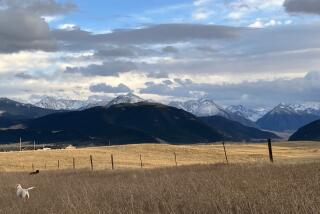Lone Eagles : Cutting-Edge Work Force Loves Flying Solo--but the Life May Not Be for Everyone
- Share via
Steve Lang fled the suburban sprawl of St. Petersburg, Fla., to launch a home business from a tiny office 8,500 feet high in the Colorado Rockies.
Author Phillip Finch swapped Portland, Ore., digs for a Kansas farm where his young children could be close to their grandparents.
Former US West telecommunications expert Monica Babine saw the phasing-out of her job as a chance to fly solo, free of corporate constraints. Now she runs a consulting business out of her home in suburban Kirkland, Wash., and can greet her kids when they come home from school, even if it means working late into the night.
All three are part of an emerging force in today’s workplace: so-called Lone Eagles.
The term, coined by Denver-based think tank the Center for the New West, is a catchy name for free-lance professionals--writers, stockbrokers, consultants and computer software programmers--who ply their trades from the Rocky Mountains, on islands in the Pacific Northwest or just about anywhere else they can flee with phone, fax and modem to escape the urban pressure cooker.
Touted as the cutting-edge work force of tomorrow, Lone Eagles are among an estimated 9 million telecommuters in the United States today. The number of people who work from home at least a few days a week is projected to grow to about 50 million by 2010. About 10% of those will succeed as Lone Eagles in their own home-based businesses, according to Joseph Pelton, a engineering professor of the University of Colorado at Boulder.
But former San Diegans Marilyn and Tom Ross have some advice for pioneering spirits who long for wide-open spaces, freedom from nerve-racking commutes and overbearing bosses, and the chance to plumb their creativity on their own schedules, in sweats instead of suits.
“Move with your head, not with your heart,” said Marilyn Ross, who with her husband wrote the 1992 book “Country Bound! Trade Your Business Suit Blues for Blue Jean Dreams.”
Their escape to a bit of Eden at the foot of the Sangre de Cristo Mountains in southern Colorado had its drawbacks--such as the need to generate their own power, find their own water source and build a home--all of which took time away from their publishing consulting business. There wasn’t even a telephone line to their 320-acre ranch, and they had trouble recruiting able workers.
In fact, getting it right took seven years and a move from a town of 500 people they call “First Try” in their self-help book for Lone Eagles. Now comfortably ensconced in a refurbished former church in the central Colorado town of Buena Vista, the Rosses are a block off Main Street and have adequate power and telephone service, but they can still gaze at 14,000-foot peaks over breakfast and lunch beside the Arkansas River.
The Rosses advise anyone considering Lone Eaglehood to explore the area’s infrastructure. Is there reliable electrical power? Are telephone lines good enough for the data transmissions you’ll make? In “First Try,” Marilyn Ross said it would have cost $60,000 to have phone lines installed to their ranch.
If your business will require frequent travel, is there an airport nearby? And is overnight mail service available if you need to send or receive a package pronto?
Even if those bases are covered, computer repair services may be as rare as a drive-by shooting in a small town.
“When you’re out there as a Lone Eagle, you are totally dependent on your equipment,” said Oliver McBryan, professor of computer science at the University of Colorado at Boulder. “If your computer breaks down, you’re out of action until you can get it replaced or repaired. In some places, that could take weeks, even months.”
Then there’s the weather to consider. In an area such as Aspen’s Roaring Forks Valley, where phone lines are above ground, heavy storms can knock them down. “If you’re someone who depends on the telephone, you could be at the mercy of the phone company for weeks,” McBryan said.
That will change, he said, in a few years when there are enough low-orbiting satellites to make cellular phone service accessible anywhere. Even so, a rookie Lone Eagle shouldn’t move too far out.
Before leaving the umbrella of a large corporation, consider whether you have the temperament for working in isolation.
“Because I’m an extrovert, I had to do things like collaborate with others on projects,” said Babine, the telecommunications consultant in Washington state. “I had to find ways to make sure I had social contact, which really meant structuring time for that. Before, when I worked at the office, it would just happen.”
Even with the networking she did, Babine still found herself “out of the loop” on advances in her field. To stay competitive, she tries to have coffee regularly with key industry people, and she volunteers at a nonprofit telecommuting organization. “It takes a lot of effort,” she said, “but it’s one way to stay connected.”
Steve Lang, who used to run a yacht-chartering business in Florida, then a waterfall design company, launched a barter finance business from a dormer room of the mountaintop house he built near Evergreen, a mountain town about 40 minutes west of Denver.
He, too, found he needed human contact, people to bounce ideas off. “You get tired of telling your business problems to the family dog,” Lang said.
So he started a nonprofit group for home-based businesses in the Evergreen area, and it now has about 75 members and meets monthly to discuss ways to handle issues such as insurance, zoning laws and professional networking.
On the personal side of the ledger, Lone Eagles who have made the break advise others to consider whether they are really suited to the place they plan to move to.
Are you a loner or a fairly social person? If the latter, you may do well to find a medium-sized town, not some hilltop where you could get snowed in for days at a time.
Do you like art films, ballet or theater? If so, locate within a reasonable drive of a large city. In “First Try,” the Rosses were at least three or four hours from Denver. In Buena Vista, they can make the trek in an hour and a half.
They’re also closer now to expert medical care, a factor they say anyone with health concerns should take into account.
Phillip Finch, author of the 1994 novel “Paradise Junction” and the upcoming “f2f” on the cyberspace world, said that although he and his wife like the slow rhythms of life in Howard, Kan., a farm town of about 500, “it really lacks opportunities for young people.” They are considering a move to a university town, perhaps Austin, Tex., or Eugene, Ore., where their children can take dance or art classes.
When scouting locales, it’s also wise to learn how the townsfolk view big-city people, Marilyn Ross said. “Some towns want growth and welcome newcomers; others don’t. ‘First Try’ didn’t want change; they were threatened by newcomers.”
But big-city people often create animosity by expecting small towns to have everything they left behind. If you’ll miss the local espresso shop or upscale mall, don’t choose an isolated rural town.
“The fastest way to become unpopular is to come in and try to remake a community in the form of what you left behind,” Marilyn Ross said. “People who do usually end up being quite miserable and going back where they came from. You need to recognize that in a small town there is much more emphasis on people and visiting than on being entertained, which I think is wholesome. You learn to substitute and compromise.”
Still, there are plenty of towns with welcome mats out for Lone Eagles.
Kerrville, a town in Texas’ Hill Country region west of Austin and San Antonio, is trying to recruit Lone Eagles because they are good for the community as well as the local economy, said Kirk McCarley, the city’s director of human resources and economic development.
“They contribute to the local economy and they don’t cost anything,” McCarley said.
More to Read
Inside the business of entertainment
The Wide Shot brings you news, analysis and insights on everything from streaming wars to production — and what it all means for the future.
You may occasionally receive promotional content from the Los Angeles Times.










